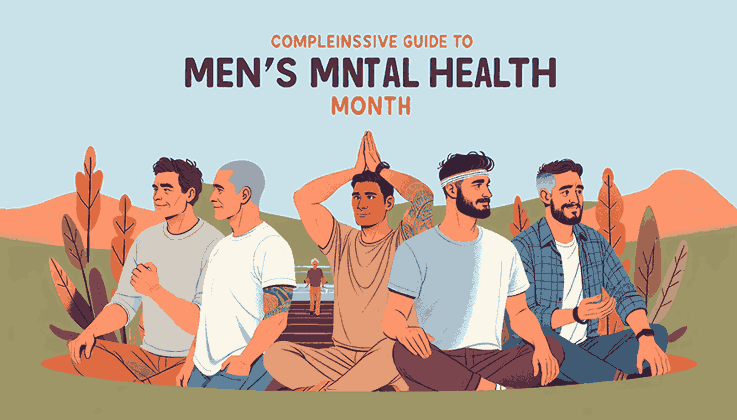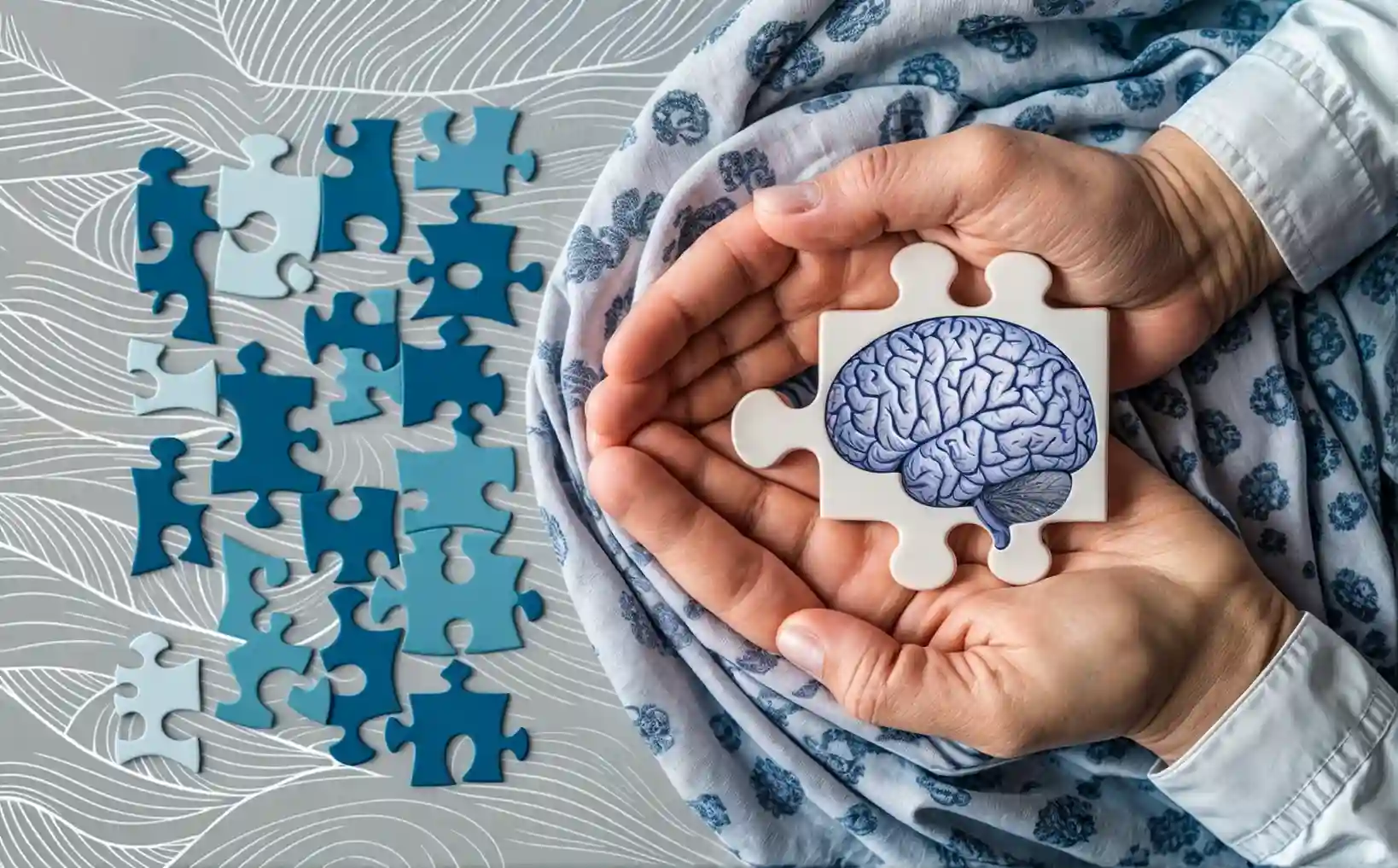Men’s Mental Health month (June)
Introduction:
Men are traditionally known for shouldering their burdens silently, often avoiding discussions around mental health due to societal expectations and stigma. This reluctance can have dire consequences, manifesting in risky behaviors, addiction, and even suicide. Men’s Mental Health Month, observed every June, shines a spotlight on these pressing issues, underlining the importance of understanding and addressing mental illness among men. It serves as a critical reminder of the unique challenges men face in dealing with mental health concerns, from societal pressures to the stigma associated with seeking help.
As the world recognizes Men’s Mental Health Month, it’s essential to foster an environment where mental health is openly discussed, and where seeking help is seen as a strength, not a weakness. This dedication to highlighting men’s mental health issues not only brings awareness but also encourages men to take a mental health test, understand their mental state, and seek the help they need. The observance provides an invaluable opportunity to dismantle the barriers to mental health support, promoting a future where men feel empowered to address their mental wellness without fear or judgment.
Recognizing the Stigma Around Men’s Mental Health:
Recognizing the stigma around men’s mental health involves understanding the multifaceted barriers that deter men from seeking help:
- Social Stigma and Gender Roles: Men grapple with societal expectations that dictate stoicism and emotional restraint. The fear of being perceived as weak or vulnerable prevents many from acknowledging their struggles or seeking assistance.
- Perception and Internalization: There’s a tendency among men to not recognize internalized disorders such as depression and anxiety as legitimate health concerns. This is compounded by misconceptions that individuals with these conditions are either dangerous or indulging in self-pity. Such beliefs contribute to the reluctance in seeking help, reinforcing the notion that ‘real men’ manage their issues without external support.
- Cultural and Environmental Influences: Stigma is not only social but also self-perceived, professional, and cultural, shaped by societal norms, cultural beliefs, and historical events. For instance, in the Black community, mental health issues are often stigmatized, viewed as taboo, or signs of weakness. This cultural perspective, along with historical mistrust in the healthcare system, further complicates the willingness to seek help. Traditional masculinity norms exacerbate this issue by promoting stoicism and discouraging emotional expression, thereby increasing psychological distress and the likelihood of substance abuse.
These barriers underscore the critical need for societal shifts in perception and the destigmatization of men’s mental health to encourage more men to seek the support they need.

Significance of Men’s Mental Health Month:
Men’s Mental Health Month, observed every June in the United States and November in the United Kingdom, plays a pivotal role in addressing the mental health challenges unique to men. This period is dedicated to:
- Raising Awareness: It focuses on illuminating the specific mental health issues men face, such as depression, anxiety, and stress, and the importance of recognizing these conditions early. The month serves as a reminder that mental health is as crucial as physical health and encourages men to seek help when needed.
- Encouraging Support and Conversations: By promoting support for mental health organizations and fostering open conversations about men’s mental health, the month aims to break down the barriers and stigma associated with seeking help. It highlights the necessity of mental health services tailored specifically to men’s needs, thereby encouraging a more supportive environment for men to discuss and manage their mental health.
- Prioritizing Mental Health: The Department of Psychiatry at UNC Chapel Hill, among other institutions, emphasizes the significance of Men’s Mental Health Month as an opportunity for men to focus on their mental well-being. This includes keeping up with health screenings, listening to the body for symptoms, making mental health a priority, managing stress effectively, and staying connected with others to foster a supportive community.
Through these efforts, Men’s Mental Health Month aims to create a future where men feel empowered to seek help and support for their mental health without fear of judgment or stigma.
Men’s mental health month quotes
Here are some inspirational original quotes to mark Men’s Mental Health Awareness Month:
- Strength lies in vulnerability. Don’t be afraid to open up about your struggles, it’s the first step to finding support and feeling better.
- Taking care of yourself isn’t selfish, it’s essential. Make your mental well-being a priority, just like your physical health.
- Behind every strong man is a vulnerable heart that deserves compassion.
- Talking it out with a friend, therapist, or family member can be incredibly helpful.
- We all confront obstacles, and seeking help demonstrates strength, not weakness.
- A healthy mind is a silent warrior, fighting battles unseen but deeply felt.
- In the journey of life, pausing for mental rest is not a detour; it’s part of the path.
- Your emotions are valid. Don’t bottle things up. Acknowledge your feelings, understand them, and find healthy ways to express them.
- You are not alone in this. Millions of men experience mental health challenges.
- Every day is a chance to start fresh. Take steps towards self-care and prioritize your mental well-being, one day at a time.
- Don’t be afraid to ask for help. Reaching out for professional support is a brave act that can lead to positive change.
- Believe in yourself and your strength. You have the power to overcome challenges and live a fulfilling life.
- Real strength lies in acknowledging pain, not in hiding it.
- In the battle for mental well-being, self-care is the armor.
These quotes aim to promote positivity and encourage men to prioritize their mental well-being. Sharing such messages can help create a supportive environment for everyone.
Men’s mental health month 2024
Men’s Health Month 2024: Key Themes and Goals
- Theme: “Teach Men and Boys How to Fish (For Health)” to encourage healthier living choices.
- Goal: To provide actionable information for lifetime health gains.
Important Dates:
- Men’s Health Month: June 1st–June 30th, 2024.
- Men’s Health Week: June 10-16, 2024.
Mission and Vision:
- Mission statement: “Teach men and boys how to fish (for health)” to encourage better lifestyles.
- The Objective is “Stronger Together, Better Always: Developing Better Health for Men & Boys, Forever” .
Remember that mental health is important for everyone, and activities like Men’s Health Month encourage general well-being.
How to Support Men’s in Mental Health Awareness Month:
Supporting Men’s Mental Health Awareness Month can be approached through various practical and impactful actions. Here are some strategies to consider:
Educate and Inform:
- Share resources and articles about men’s mental health on social media platforms to raise awareness.
- Host webinars or workshops with mental health professionals to discuss men’s mental health issues and solutions.
Create Supportive Spaces:
- Organize community support groups where men can share their experiences and challenges in a safe and non-judgmental environment.
- Encourage workplaces to initiate conversations about mental health, offering resources like counseling services or mental health days.
Participate in Awareness Campaigns:
- Join or organize awareness events such as walks, runs, or fundraising activities dedicated to men’s mental health.
- Wear symbolic colors or ribbons throughout the month to show support and spark conversations about men’s mental health.
Implementing these actions can significantly contribute to reducing the stigma around men’s mental health, encouraging more men to seek the help they need and fostering a community of support and understanding.
understanding men’s mental health concerns:
Understanding men’s mental health concerns requires a comprehensive look at the symptoms, behaviors, and societal influences that impact their well-being:
Symptoms and Behaviors:
- Common symptoms of mental health disorders in men include anger, irritability, aggression, changes in mood or energy level, and difficulty sleeping.
- Men may experience physical symptoms such as body aches/pains and have difficulty focusing or engaging in activities they once enjoyed.
- Risky behaviors, such as substance abuse, compulsive gambling, and engaging in high-risk activities, are often signs of underlying mental health issues.
Societal Influences and Stigma:
- Men are less likely to seek help due to societal expectations that promote stoicism and emotional restraint.
- The stigma surrounding mental health, coupled with a reluctance to discuss or acknowledge struggles, leads to underdiagnosis and undertreatment.
- Intersectionality, including factors like race, sexuality, and disability, further complicates the mental health landscape for men, making some groups more susceptible to mental health conditions.
Impact on Life:
- Untreated mental health issues can lead to severe consequences, including high blood pressure, heart disease, and chronic health conditions.
- Mental health can significantly affect men’s relationships, work life, and personal goals, leading to reduced motivation, lower productivity, and poor performance.
- Ultimately, mental health concerns in men can have a ripple effect, impacting not only the individual but also their families, friends, and colleagues.

Barriers to Seeking Help:
Despite the growing awareness around mental health, significant barriers still prevent men from seeking the help they need. These obstacles can be outlined as follows:
Cultural and Societal Expectations:
- Only 8% of American men receive counseling or therapy, highlighting a pervasive reluctance to seek professional help.
- This reluctance is further exemplified in men being less likely to consult a doctor or get diagnosed with conditions like migraines, indicating a broader issue of avoiding medical assistance.
Technology as a Potential Solution:
- Telehealth, online therapy, and low-cost therapy apps present promising avenues to encourage men to seek help for mental health challenges, offering more private and accessible options.
Consequences of Not Seeking Help:
- Men often attempt to handle mental health issues alone, which can escalate to severe consequences, including risky behaviors, addiction, and suicide.
- The term “deaths of despair” encompasses alcoholism, overdose, and suicide, conditions men are more likely to suffer from, yet they are far less likely than women to seek out mental health services.
- Only 35% of men reported they would seek help from a mental health professional compared to 58% of women, underscoring a significant gender gap in seeking mental health support.
The Role of Awareness Campaigns and Activities:
Awareness campaigns and activities play a crucial role in addressing men’s mental health, employing strategies that resonate with their experiences and encourage open discussions:
Creating Safe Spaces: A study highlighted the effectiveness of creating safe spaces specifically for men, embedding interventions in communities, and using male-sensitive language and activities. This approach, coupled with forming trustworthy partnerships, has been shown to reduce stigma and increase engagement in mental health discussions 23.
Social Media and Campaigns:
- Social media platforms have proven to be powerful tools, reaching approximately 10.3k people in a short time, making them ideal for hosting mental health promotion campaigns.
- Notable campaigns like Movember and Boys Do Cry utilize unique approaches to foster conversations about men’s mental health. Movember encourages men to grow mustaches as a symbol of support in November, while Boys Do Cry reinterprets a popular song to encourage men to speak up about their struggles.
Key Processes for Engagement:
- Utilizing role models to convey information and offering psychoeducational material to improve mental health knowledge are critical.
- Assistance with recognizing and managing symptoms, active problem-solving tasks, and motivating behavior change are also beneficial. Signposting services and content that builds on positive male traits like responsibility and strength have been shown to improve help-seeking attitudes, intentions, or behaviors among men.

Towards a Future Without Stigma:
Towards a future without stigma, it’s crucial to emphasize strategies that not only improve men’s mental health but also foster a society that encourages seeking help without fear of judgment. Key strategies include:
Prioritizing Self-Care and Well-being:
- Engage in regular exercise and ensure adequate sleep.
- Practice meditation and mindfulness to enhance emotional well-being.
- Encourage men to seek support and professional help when needed, emphasizing that mental health is crucial throughout the year, not just during Men’s Mental Health Month.
Building Social Connections:
Combat loneliness and social isolation by becoming part of a social circle, as social connection is essential to our health and well-being 14.
Increase diverse role models of positive masculinity to provide examples that men can relate to and aspire towards 7.
Education and Awareness:
- Mental health providers should adhere to APA guidelines for working with boys and men, ensuring culturally competent care.
- Implement mandatory cultural competency training for physicians in medical schools to better understand and address the unique challenges men face.
- Diversify the pool of mental health providers in both urban and rural areas to ensure accessibility and variety in care options.
By adopting these strategies, we move closer to a future where men’s mental health is prioritized, and the stigma surrounding seeking help is dismantled.
Why is Men’s mental health month ignored:
Men’s Mental Health Month: A Growing Recognition
- Men’s mental health difficulties are frequently underestimated owing to social preconceptions of power and weakness.
- Some countries, such as the United Kingdom, are unaware of the month’s significance.
- The month’s emphasis on physical health concerns, such as prostate and testicular cancer, may overshadow the mental health focus.
- Despite these hurdles, Men’s Mental Health Month is gaining popularity, with the goal of breaking down cultural stigmas and encouraging open discussions on men’s mental health.
- Several groups and people are attempting to increase awareness, provide services, and promote a culture that prioritizes men’s mental health.
Men’s mental health month November:
Men’s Mental Health Awareness Months: June and November
June (Men’s Mental Health Awareness Month):
- Recognized by Mental Health America (MHA) and the Global Men’s Health Month website.
- Promotes awareness, open conversations, and support for men’s mental health.
- Some individuals wear green ribbons to show their support.
- Activities include arranging events, fundraisers, and awareness campaigns.
November (Movember):
- A global movement in which men grow mustaches to raise awareness about different men’s health concerns.
- The focus areas include prostate cancer, testicular cancer, mental health issues, and preventing suicide.
- Activities include growing mustaches, raising money, and having discussions about men’s health.
- Promoting men’s mental health is critical year-round.
Men’s mental health month uk:
Men’s Mental Health Awareness Month in the United Kingdom (UK)
- November is Men’s Mental Health Awareness Month in the United Kingdom (UK).
- The campaign seeks to promote awareness and reduce stigma surrounding men’s mental health difficulties.
- Men have a high suicide rate, and suicide is the leading cause of death among men under the age of 50 in the United Kingdom.
- Societal norms frequently impede frank conversations regarding mental health.
Gender Awareness Month offers a safe area for men to express their emotions and get support.
- LionHeart, a support group, provides discreet counseling and free seminars on mental health issues.
Conclusion:
Through the exploration of the challenges and barriers confronting men in acknowledging and addressing their mental health, this article has underscored the significance of Men’s Mental Health Month and the collective efforts needed to mitigate these difficulties. The discussion illuminated societal expectations, the stigma associated with mental health, and the imperative to create more supportive environments where men can freely express their vulnerabilities. Moreover, it presented practical strategies for individuals and communities to engage in, aiming to foster greater awareness, reduce stigma, and encourage help-seeking behaviors among men.
The journey towards destigmatizing men’s mental health issues is far from over, but with sustained awareness campaigns, educational efforts, and the promotion of open conversations, there is hope for a future where seeking help is a sign of strength, not weakness. Encouraging men to prioritize their mental well-being, understanding the pivotal role of societal support, and continuously championing the cause beyond just the observance month are steps in the right direction. As we conclude, it’s clear that the collective endeavor to address and enhance men’s mental health remains a vital, ongoing mission, reflective of a society that values well-being and inclusivity for all its members.
FAQs:
How Can We Support Men's Mental Health Month?
To support Men's Mental Health Month, consider organizing a lecture on men's health with a local nurse, doctor, or health educator at places like your workplace, church, community group, senior center, or health department. Additionally, distributing educational and promotional materials such as brochures, posters, caps, pens, t-shirts, and Blue Ribbon pins can help raise awareness and support the cause.
What Steps Can Be Taken to Reduce the Stigma Around Men's Mental Health?
Reducing the stigma surrounding men's mental health begins with open conversations. Sharing knowledge about mental health and personal experiences can foster empathy and combat the isolation often associated with mental illness in men. It's crucial to remind men that seeking help is a sign of strength and courage, not a weakness.
What Are the Most Common Mental Health Issues Faced by Men?
Men commonly experience several mental health challenges, including:
Depression: This is marked by a prolonged period of low mood that significantly affects one's daily life.
Anxiety Disorders: These disorders involve intense, uncontrollable feelings of fear and worry.
Schizophrenia: A complex condition characterized by distorted thoughts, perceptions, emotions, and behaviors.
PTSD (Post-Traumatic Stress Disorder): This condition can follow after experiencing or witnessing traumatic events.
Substance Abuse: The harmful use of substances like alcohol and drugs.
What Does the Term "Toxic Masculinity" Mean?
Toxic masculinity refers to societal expectations that promote the idea of manliness as synonymous with dominance, homophobia, and aggression. This concept pressures men to conform to specific behaviors and attitudes that can be harmful to themselves and others. It is a pervasive issue that affects boys and men in various ways, influencing their actions and how they express emotions.





